- India
- International
Not just JNU: How India’s public universities becoming costlier hurts the most vulnerable
The inequality in India’s education system gets a shot at redemption in the country’s public universities, which give students from different backgrounds a window to a more democratic future. As proposals of fee hike meet with protests, a look at how access to subsidised higher education has fuelled dreams and opened up opportunities for the disadvantaged
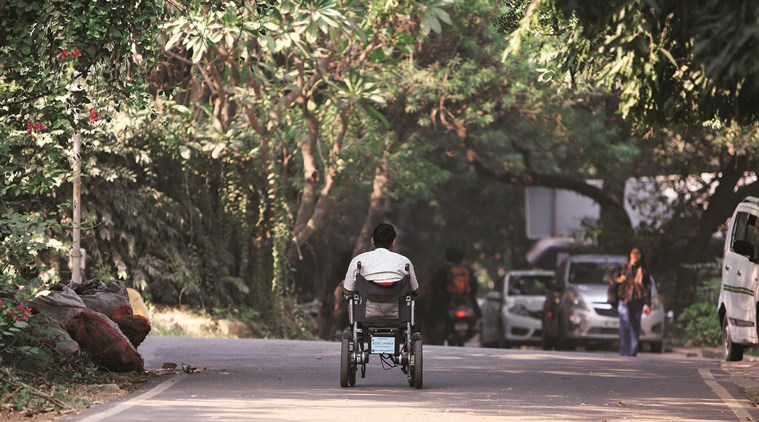 Suraj Tiwari, JNU student. (Express Photo by Gajendra Yadav)
Suraj Tiwari, JNU student. (Express Photo by Gajendra Yadav)
Till three years ago, it was life as usual for Suraj Tiwari. His father worked as a tailor in Mainpuri, Uttar Pradesh, where he would rafoo (darn) torn clothes. The income wasn’t much, but Tiwari, 25, and his elder brother both worked as blue-collar employees in big corporate plants, and managed to earn Rs 12,000 per month each to sustain the family.
Then, it all unravelled. Tiwari was in a train on January 29, 2017, when he slipped and fell on the tracks. He was rushed to the AIIMS Trauma Centre, where his treatment lasted four months. At the end of it, he had lost both his legs from knee down, his right arm till the elbow, and two fingers of his left hand. His treatment, he says, cost around Rs 14 lakh, of which around Rs 8 lakh was from a loan taken by his father.
Opinion | First-generation learners at JNU are beacons of hope for their communities
“I remember feeling like a burden. I didn’t know what to do. It was during my time in AIIMS that I came in contact with Akshansh Gupta (Jawaharlal Nehru University alumnus who has cerebral palsy). He told me to study and prepare for JNU. He gave me books. I suddenly saw a ray of hope,” says Tiwari, who is now a student of BA Russian at JNU.
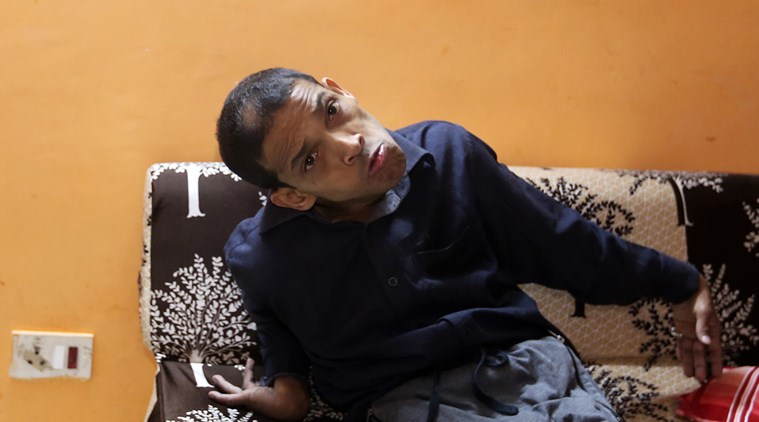 Akshansh Gupta finished his PhD in Computer Science from JNU(Express Photo by Gajendra Yadav)
Akshansh Gupta finished his PhD in Computer Science from JNU(Express Photo by Gajendra Yadav)
But there were more setbacks. In May that year, he appeared for the BA foreign language course at JNU. A few days later, he got news that he had lost his elder brother in a road accident. The family lost two earning members in a short span of time; Tiwari’s father soon fell ill and required surgery. To add to it all, in July, Tiwari also got the news that he did not clear the entrance exam. “I had lost my limbs and brother, our economic condition became very bad. At that time, I lost the will to live. I wanted to take my own life. Par main toh iss layak bhi nahi tha ki khud se mar sakoon (I wasn’t even capable of killing myself),” he says.

That’s when things finally looked up for him. JNU had decided that year to hold entrance exams twice a year, in May and December. “When I got to know I had another shot, I gave it my all. For three months, I only studied and appeared for the December exams. When I finally got through, I was on top of the world. For people like me, there is no life without education,” he says.
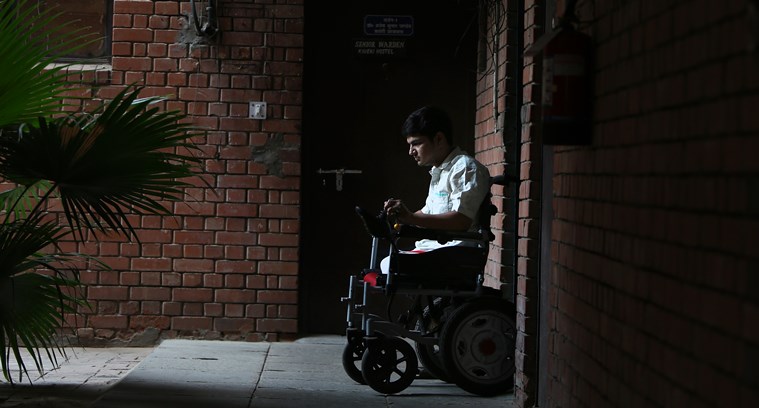 In JNU, Suraj Tiwari gets Rs 2,500 every month as his Merit-cum-Means (MCM) scholarship and another Rs 2,500 each month as escort allowance. (Express Photo by Gajendra Yadav)
In JNU, Suraj Tiwari gets Rs 2,500 every month as his Merit-cum-Means (MCM) scholarship and another Rs 2,500 each month as escort allowance. (Express Photo by Gajendra Yadav)
In JNU, Tiwari gets Rs 2,500 every month as his Merit-cum-Means (MCM) scholarship and another Rs 2,500 each month as escort allowance. There are still times, when despite his scholarship and allowance, he hasn’t been able to pay the hostel fee but people have always helped him out. “Whether it’s giving me money when I don’t have it, or helping me in other ways, students and teachers here have golden hearts. I am preparing for IAS now. This university is heaven on earth for me. It has given me everything. Whatever I become from here on is to JNU’s credit,” says the resident of Kaveri Hostel.
His story is one of courage and hope, of finding wings to fly up and away from a pit of despair. It’s his story but it’s also the story of thousands of students across India from marginalised backgrounds whose lives changed forever once they entered a government college campus. It’s the story of students whose dreams of higher education were realised only because of subsidised fees, which is why the spectre of a fee hike has got campuses up in arms.
There are others like Tiwari. In 2015, Akshansh Gupta, 36, hit the headlines, for being a person with cerebral palsy who finished his PhD in Computer Science from JNU. Economically speaking, he would not have fallen into the poorest of JNU’s students, 40 per cent of whom come from families with their monthly income less than Rs 12,000 per month, as per JNU’s annual report of 2017-18.
Opinion | Why we must listen to JNU
His father runs a wedding card business in Jaunpur, UP, and earns around Rs 3 lakh per annum. Yet, he felt marginalised due to his ailment. “JNU is not just what it is because of its fee structure and admission policy, but also because of its infrastructure and support system. In any other university, I would have not been able to finish my PhD. The university needs government funds so it can expand infrastructurally and give people with disabilities a more equitable education. Raising the fee is not right,” the alumnus says.
Universities such as JNU have not only given the less privileged a chance at higher education, but also given women students – who constitute 51 per cent of the student population in JNU – a sense of identity and more exposure than they would normally have.
Also Read | Among top 10 central universities, JNU hostel fee highest after hike
As a student at Sarvodaya Kanya Vidyalaya in Mehrauli, Shivani Yadav, 21, had many friends. Yet, she would be reluctant to invite them home. Her father, who is physically disabled, works part-time in a medicine factory, and her mother is a homemaker. She has two sisters.
“We all used to stay in a rented one room apartment in Kishangarh. Now my elder sister has moved to Udaipur where she’s working as a sales executive in a hotel, but everyone else stays there. Outside there’s a toilet, but there’s no bathroom as such,” she says. Yadav remembers feeling ashamed when she took her friends home. “Some of them made snide remarks and they stayed with me,” she says.
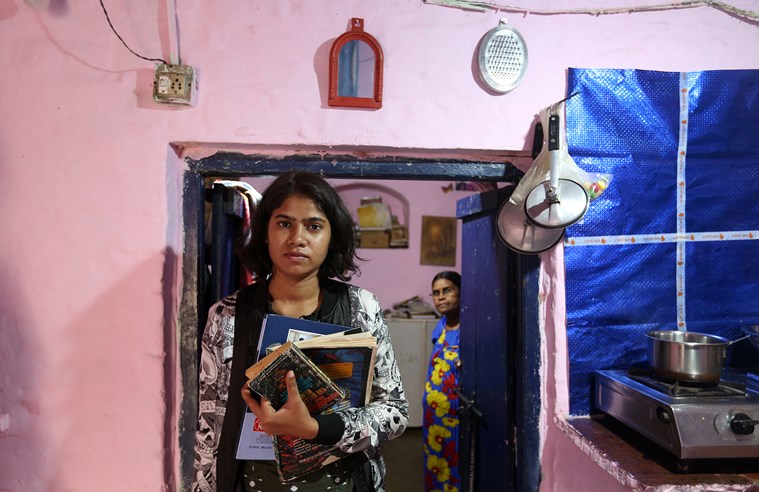 Shivani Yadav JNU student at her home. (Express Photo by Gajendra Yadav)
Shivani Yadav JNU student at her home. (Express Photo by Gajendra Yadav)
From now to then, a lot has changed for Yadav. With the help of an NGO, she was able to learn English and speaks fluently, but more importantly, she got herself enrolled at JNU. “In 2016, a teacher from an NGO called Samarpan Foundation, suggested to me that I should apply for JNU, so I gave the exam and cleared it. Since my domicile address is that of Sultanpur, UP, I also applied and got a hostel, because it’s not possible to study at home,” she says.
Currently, a final year student of BA Chinese, Yadav hopes to work as a translator. “My father earns between Rs 5,000-6,000 per month, but it varies. My sister also sends Rs 5,000 a month home. Since my younger sister is completing her BA from DU, they have to spend on her education too,” she says. She gets Rs 2,000 per month from home, and depends on her Rs 2,000 per month MCM scholarship for paying the hostel mess bill. “This month also I couldn’t pay because I didn’t get my MCM scholarship, so I had to borrow and pay the bill which was Rs 4,600 for two months,” says Yadav.
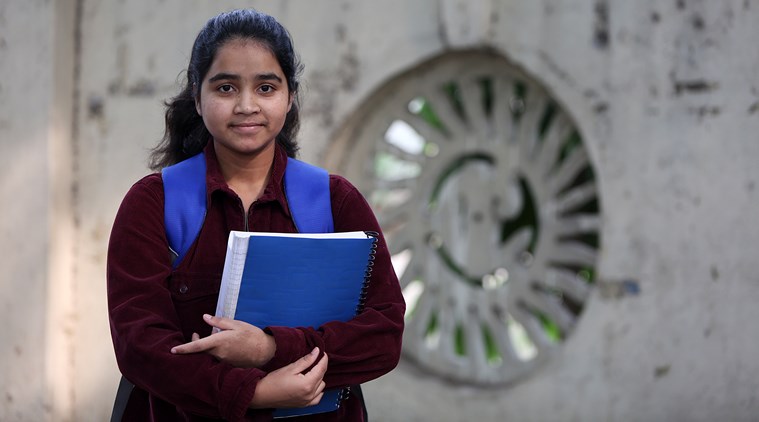 Manisha Arya, who studies geography in IP College for Women, Delhi. (Photo: Gajendra Yadav)
Manisha Arya, who studies geography in IP College for Women, Delhi. (Photo: Gajendra Yadav)
Manisha Arya wasn’t always sure she would make it to a college. But in June last year, Arya left the cool climes of her hometown Ranikhet in Uttarakhand and made the 400 km journey to Delhi in the hope of getting admission to Delhi University — joining a group of over two lakh applicants, a large section of them from outside the Capital, who queue up outside its over 90 colleges in the sweltering heat every year, with big scores and even bigger dreams.
The 19-year-old had first heard about the University from seniors at her boarding school in Dehradun — Him Jyoti School — where she had been sponsored to study by a trust. But it was only after she secured 93 per cent marks in Class XII, and when her domestic help mother’s employer encouraged her to look beyond Uttarakhand, that she firmed her resolve “to step out of my comfort zone.”
Her father, a driver, came with her to Delhi, but didn’t accompany her to colleges. “Together, my parents make less than Rs 1 lakh a year, and DU was my only hope. I had missed the application dates for Jawaharlal Nehru University and I could not afford the high fees of private colleges,” says the eldest of three siblings.
In her early years, Arya’s reality and dreams seldom crossed paths. After studying at a private school in Ranikhet till Class III, she was pulled out by her parents because of lack of funds. It was the first time that the crumbling primary school education system of the country was laid bare before her. “I was put in a Hindi medium government school. The teachers didn’t come, there were hardly any classes,” says Arya, who joined the school in Dehra Dun afterwards.
Years later, in 2018, as she walked around Indraprastha College for Women in Delhi, after securing admission to its Geography (Hons) programme, another sponsorship would take her a step closer to her dreams of becoming a professor. “The fee for my course was Rs 15,000 per annum and my family said they could manage that. But the hostel fee was Rs 75,000 per semester — completely out of my budget. Even sharing a flat would have cost me Rs 5,000 per month, which my family couldn’t spare. So, I approached the principal of the college, who waived off my tuition and accommodation fee. It was such a relief,” she says.
For Arya, and thousands of other underprivileged students like her, institutions such as DU offer the rare combination of credible education at a nominal fee. At a time when scores of private institutions have cropped up across the country, where the fee per semester starts at a minimum of Rs 1 lakh, DU’s Honours courses are offered at a fee between Rs 15,000 and Rs 25,000 per year. While the hostel fee starts at Rs 5,500, each of its 20 hostels have a different fee depending on the facilities available.
Arya now wants to apply to JNU because she says she can’t afford a private college. Her options have now pared down to a master’s degree in JNU or a return ticket home, which is why JNU’s proposed fee is a matter of concern to students like her.
Early this month, JNU had announced a revision to the Inter Hall Association (IHA) manual. This will mean levying service and utility charges from students, apart from increasing their room rent. The proposal saw the campus erupt with protest. As per the original hike, students would have had to pay upwards of Rs 7,000 per month, which included around Rs 1,700 per month in service charges, utility charges as per actual, mess bill which costs around Rs 2,500 a month, Rs 600 per month if it was single seater and Rs 300 if it was a double seater, along with paying Rs 1,100 per semester as establishment charges and Rs 12,000 as refundable security deposit.
For Below Poverty Line (BPL) students, the fee was reduced by 50 per cent. However, the university has been unclear on how it will define and identify BPL students, with experts claiming there’s no standard line that exists across the country now.
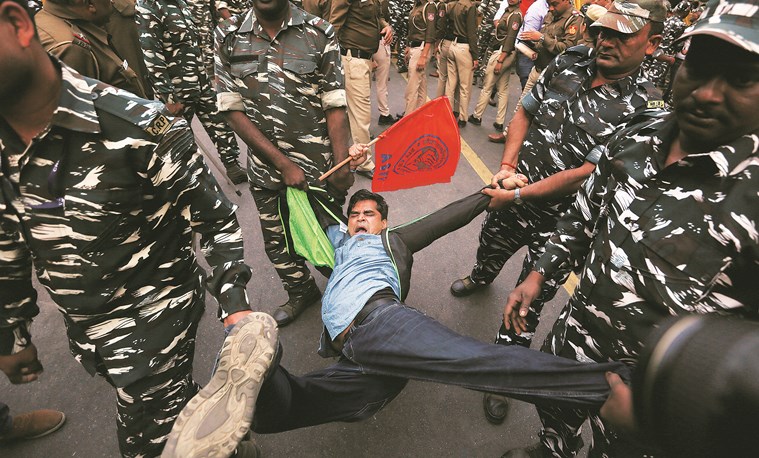 Akhil Bhartiya Vidyarthi Parishad (ABVP) who were protesting against JNU hostel fee hike were stopped by the police at Parliament Street on Thursday. (Express Photo by Gajendra Yadav)
Akhil Bhartiya Vidyarthi Parishad (ABVP) who were protesting against JNU hostel fee hike were stopped by the police at Parliament Street on Thursday. (Express Photo by Gajendra Yadav)
With protests raging on for a month, the administration was forced to make two revisions to its original hike. The second came by way of a high-level committee appointed by the university, which suggested a 50 per cent reduction in fee for all students, and 75 per cent for BPL students. This has, however, been rejected by both the students’ union and the teachers’ association who say they want nothing less than a complete rollback.
For students like Tiwari, a hike is unimaginable. “There’s no way I will be able to afford it. For people like me there will be only two options — either beg at railway stations or commit suicide,” he says.
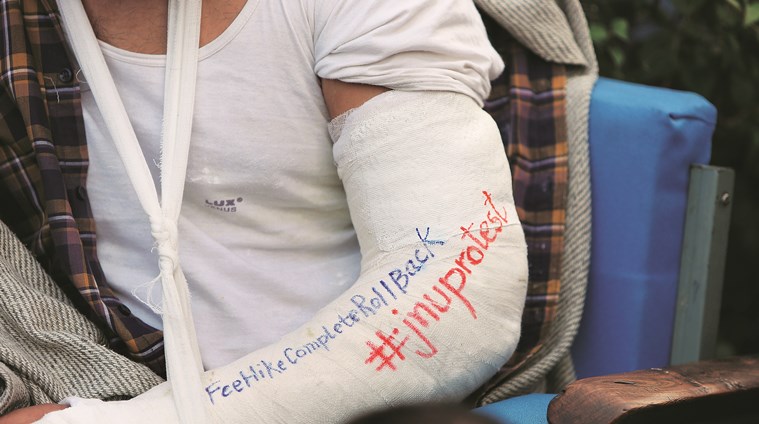 A JNU student protesting the proposed fee hike (Express Photo by Gajendra Yadav)
A JNU student protesting the proposed fee hike (Express Photo by Gajendra Yadav)
But it’s not just JNU, students are also pouring in other public universities with the hope of making something in their life. At Jamia Millia Islamia, many Muslim students join in the hope of getting the Ministry of Minority Affairs (MOMA) scholarship.
When Mohammad Tabrez Alam, 20, finished his class 12 from a Bihar State Board affiliated school in his hometown Siwan in 2016, he applied to all public universities for his graduation.
For a farmer’s son, with just 1.5 bigha land, the option of private universities was completely shut. “The only income at home is from agriculture which is not more than Rs 80,000 annually. We mostly grow rice and wheat, which we sell as well as consume,” he says.
Alam’s three elder sisters are married and have moved away from home, but his younger sister continues to stay at home. She’s completed her BA from a state university back home.
“I had applied to many universities after class XII, but I didn’t get into any degree course. The only course I got through was a three year Diploma in Civil Engineering from Jamia Millia Islamia. I thought once I finish it, I’ll be able to work and earn for my family. I could not afford to do a degree course from some private university,” he says. For the first two years of his course, Alam was not allotted a hostel and had to stay on rent. “There were six of us staying in two rooms. It cost me around Rs 1,500 per month because that’s all I could afford,” he says.
The MOMA scholarship he got for the three years – around Rs 3,800 per year – was about half his college fee; the mess charges were separate. In his final year, Alam also got Rs 6,500 as the JMI Alumni scholarship. “When I got the hostel, I would pay around Rs 2,250 just for the mess bill. When I got money from home, I paid it, but by the end I had accumulated mess dues of around Rs 17,000 which I had to pay in one go, because I couldn’t pay them earlier,” he says.
Now, having finished his Diploma course, Alam finds that there aren’t many jobs in the market for the likes of him. “I want to prepare for IAS, but also apply for a degree course in B Tech or BE,” he says.
He says although the scholarships did not help him much, without public funded education, his life would have been much more difficult. “I may not have been able to do my graduation, or I would have had to take a huge loan. Education should be affordable for all,” he says.
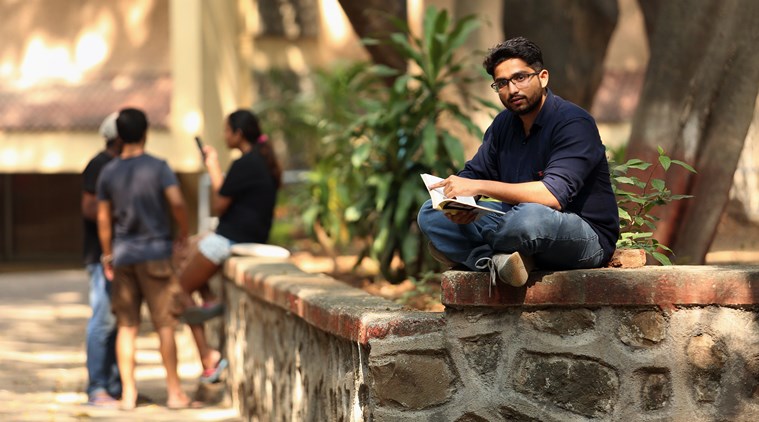 Nikhil Sanjay-Rekha Adsule has completed B.E (Electrical) and LLB from Savitribai Phule Pune University (SPPU) and pursued his Masters in History from I.G.N.O.U and currently, he is studying Masters of Law in Access to Justice from TISS. (Express Photo by Prashant Nadkar)
Nikhil Sanjay-Rekha Adsule has completed B.E (Electrical) and LLB from Savitribai Phule Pune University (SPPU) and pursued his Masters in History from I.G.N.O.U and currently, he is studying Masters of Law in Access to Justice from TISS. (Express Photo by Prashant Nadkar)
Students at the Tata Institute of Social Sciences (TISS) in Mumbai are all too familiar with the churn that’s shaking up campuses in Delhi. In October this year, before TISS started its admission process for the next year, Nikhil Adsule, along with a few friends, started an unofficial helpline service for students from the marginalised communities interested in enrolling with the institution. With a picture of Dr BR Ambedkar along with their contact numbers, they shared the post on social media platforms, inviting queries about the admission process from students from economically weaker sections, Dalit, Bahujan and Adivasi communities and other minorities including OBCs and Muslims. Of the 150-plus calls they received, most were queries about the fee structure and possibilities of scholarship and subsidies. However, Adsule and his friends, who are all students at the institution, admit that hardly any of the inquirers followed up the initial call with an interest in studying at TISS. They believe this is a direct consequence of the aid withdrawal at TISS last year.
Until 2018, TISS offered the Government of India — Premetric Scholarship Scheme to SC, ST and NC-OBC students who came from families with annual incomes of less than Rs 1 lakh. These students could pursue their education with an upfront payment of Rs 4,500 as the annual tuition fee. However, after the withdrawal of the waiver, the annual fees have been hiked up to Rs 66,000 to include the hostel and the dining hall charges. “Many students from marginalised communities used to consider TISS as an option because it was an elite institution for social sciences that made space for them. It offered people like us a chance at quality higher education, which is otherwise a prerogative of the privileged,” says Adsule.
A first year student, Manohar Athawale* had considered TISS while pursuing his masters for several reasons. One was its reputation at being a liberal institution with quality higher education in social sciences, which would increase his chances at job opportunities. “These institutions equip people for critical thinking and allow us an exposure to the world we have so far been alienated from by making us share the space with students from diverse backgrounds. But one big reason was the fact that TISS offered scholarships to students like me,” adds Athawale. However, by the time he was applying to TISS, the waiver had been withdrawn.
Athawale is a fine example of how subsidised education and schemes can help students from marginalised backgrounds a chance at education. Athawale, who comes from a rural background, lost his parents at an early age. His extended family, who believed in Ambedkar’s idea of emancipation through education, sent him to a hostel run by the Women and Child Welfare Department. His high scores in Class XII got him a waiver for graduation studies and his performance there further helped him get aid for his masters. Athawale also worked extra hours assisting teachers, translating or doing other odd jobs in order to sustain himself and support his younger sibling’s education. He has managed to go through the first year at TISS but is unsure how he will manage hereon.
“The biggest benefit of a subsidised education for students like me is that it allows us financial stability and lets us focus on our studies. Education requires an environment where the mind is at peace about, at least, the basic needs. In the past, I have seen times where we would not have water supply for five days or when drinking water would be made available in long intervals. How does one concentrate on studies in such circumstances?” he says.
Tathagata Mandal*, an alumnus of Presidency College in Kolkata would agree. The son of tailors, Mandal did a BSc in Geography in 2011 and went on to crack the recruitment exam of West Bengal School Service Commission. He is now a school teacher, pursuing his PhD from the University of Burdwan. “I still remember the admission fee at Presidency College was Rs 900. It was not an insignificant amount for us. Over the next three years of BSc and then two years of MSc in Ballygunge Science College, it was the subsidised education costs that kept me going. I would also get some money as scholarship and taught about 5-6 students to ensure that I took a minimal amount from home. Without a public funded education system, I don’t think I would have made it this far,” he says.
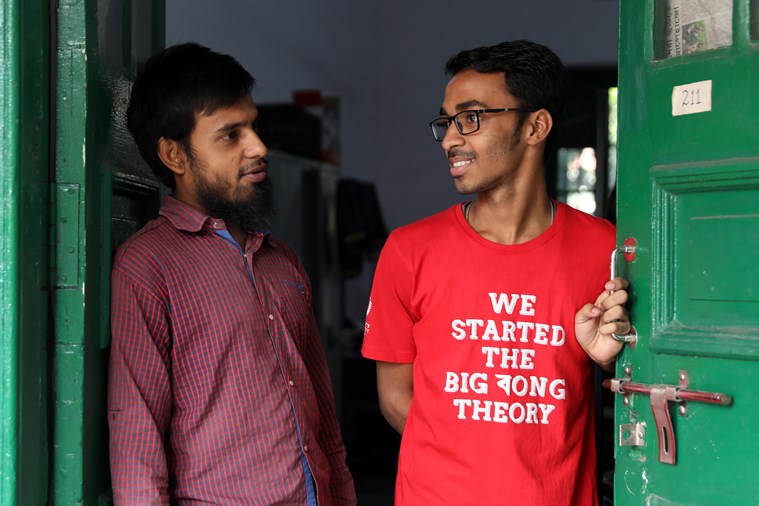 Left to right: SK Rinku( Bengali 3rd year) and Soumen Mahato (Chemistry 3rd year) students of Presidency University at their hostel in Kolkata , adjecent to University. (Express photo by Partha Paul)
Left to right: SK Rinku( Bengali 3rd year) and Soumen Mahato (Chemistry 3rd year) students of Presidency University at their hostel in Kolkata , adjecent to University. (Express photo by Partha Paul)
Neha Manjule*, a PhD student in social science at TISS says that the numbers of students from marginalised backgrounds in TISS have drastically dropped since the withdrawal of the waiver. Among those who protested the withdrawal, Manjule claims their survey of the new batches reveals that they are low on diversity, especially in terms of gender. “Girls from marginalised backgrounds have to fight twice as hard to come to places like TISS but the withdrawal of aid has killed the chances for many like me,” she says. The overheads do not help either. Adsule, a student of the one-year LLM course, points out that students need to shell out Rs 2,500 each time they present a research paper, which is mandatory. He believes that the education system in India is designed to keep students like him out. “Even though my father is a government servant with a steady income, I could not afford to apply to the NLUs, where one has to cough up Rs 2,500 for the entrance to each NLU. I can apply to TISS because the entrance fee wasn’t forbidding but these overheads do cause a crunch.”
Countering the claim by Athawale, Adsule adds that contrary to popular belief, such elite organisations do not help break barriers to sensitise other students about the marginalised. “I have faced casteism in the classroom on several occasions in the form of taunts and comments, or their sheer dismissal of the struggles that students from lower castes face,” he says. Another student, on condition of anonymity, says the pressures take more subtle forms. “If a majority of the students come from upper classes, our interaction with them will be limited to the campus. Someone like me, who cannot afford joining them for coffee, will miss out on discussions that a large part of the class is having on politics and its undercurrents over that cup of coffee. Besides, there will always be a gap between their universe and ours,” says the student. She points out that she recently watched Joker, her first English film, because she felt “left out” in the discussions taking place among her peers. “Having studied in Marathi medium throughout, I picked up English only during my post graduation. That in itself was a struggle. But when I watched the film, I realised that I can never match up, that my views will never be the same as my peers because I had no context of Joker in popular culture and the universe it inhabits,” she explains.
In fact, the backlash that the striking students faced has led to great disillusionment. Manjule recounts the strike, which lasted over 100 days at the Mumbai campus, as an instance when many of her upper class peers made the effort to understand the issue and stood by them in their fight against the management’s decision. “One of our demands was that like JNU, TISS, too, should get the status of a central university. But, eventually, we had to call off the strike because we had begun to face the consequences of raising our voices. Some students were slapped with court notices and fines; there were some whose degrees were held back. While we all support JNU’s struggle, we cannot openly voice this for fear of persecution,” says Manjule.
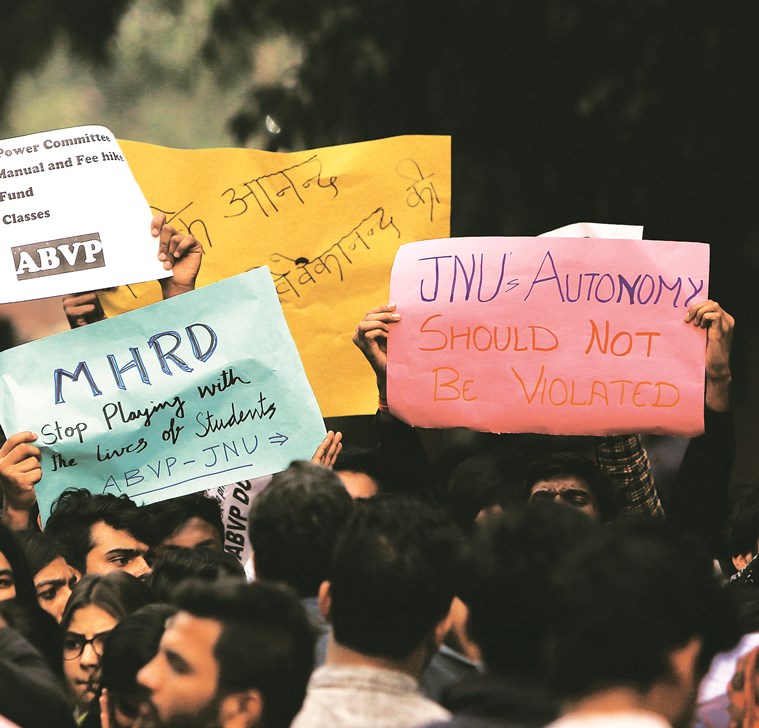 A protest march in DU in support of the agitating JNU students (Express Photo by Gajendra Yadav)
A protest march in DU in support of the agitating JNU students (Express Photo by Gajendra Yadav)
But many students all over India are vocal in their opposition to JNU’s proposed fee hike, pointing out how in an unequal world public universities give everyone an equal opportunity and foster an exchange of ideas between people from varied backgrounds. From Alipurduar, West Bengal, now Lecturer in Postcolonial Studies at the University of Glasgow
Sourit Bhattacharya, a lecturer in postcolonial studies at the University of Glasgow, joined Presidency College as a student in English Lit Honours in 2004. The same year, his father retired from his job as a clerk in the Lands Reforms Deptt, with a pension of Rs 2,837 per month. With two college-going sons, the burden of their academic fees would have been difficult for him but for the subsidised education fees. “I paid Rs 75 a month during my graduation. I was a graduate after spending just Rs 2,700 in three years! It’s even difficult to imagine this sometimes,” he says.
“In social science, we are taught not to let our immediate context bias our worldview. But at JNU, there was so much diversity that one learnt something everyday. I saw such strong, motivated women… I learnt so much from them. Then before I got a hostel, I stayed with V Lenin Kumar, the former JNU president. His journey to the capital and to JNU despite coming from a deprived background taught me so much,” says Vaibhav Raaj, who completed his MPhil from JNU in 2012 and now works with the United Nations agency International Labour Organisation. For 21-year old Alifur Rahman, a first year post-graduate student at Jadavpur University’s History department, who hails from Karimpur in Nadia district, it was a combination of subsidised fee, a monthly scholarship of Rs 1,200 from the JU Alumni Association and giving tuitions that funded his college education. Education, like health, he says, should be free. “If the government is spending so much on defence, then can’t it allocate more for education?” he asks.
Inputs by Saikat Bose and Santanu Chowdhury
* Names changed on request. This article appeared in the print edition with the headline ‘The Long Road to Hope’
Apr 19: Latest News
- 01
- 02
- 03
- 04
- 05






































